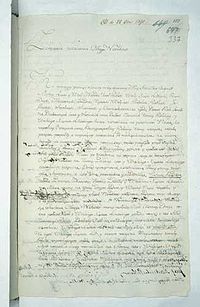- Reciprocal Guarantee of Two Nations
-
Reciprocal Guarantee of Two Nations (Polish: Zaręczenie Wzajemne Obojga Narodów)[1][2] other translation is Reciprocal Warranty of Two Nations[3]) was an executive addenddum to the Polish Constitution of May 3, 1791, passed by the Great Sejm, which concerned the status of the Polish-Lithuanian union. It affirmed the unity and indivisibility of Crown of Poland and the Grand Duchy of Lithuania within a single state. It stressed the federal character of the state and was concerned with guarantying the equality (equal representation in state-governing bodies) of the two parts that constituted it (Crown of Poland and the Grand Duchy of Lithuania).[4]
It confirmed that the state (Polish-Lithuanian Commonwealth, now officially known as the Rzeczpospolita Polska) was still a union of the Crown of Poland and the Grand Duchy of Lithuania. It specified that they have a common government, military and treasury (although it was specified that the Lithuanian tax income was to be spent in the Grand Duchy). The military and treasury commission were to have equal numbers of Polish and Lithuanian officials, and were to be presided by Polish and Lithuanian officials in a rotating order. Poland and Lithuania were to have the same numbers of officials.
Acts of the Polish–Lithuanian union (1385–1569) Krewo (1385) · Vilnius and Radom (1401) · Horodło (1413) · Grodno (1432) · Kraków and Vilna (1499) · Mielnik (1501) · Lublin (1569)
See also: 3 May 1791 Constitution (Reciprocal Guarantee of Two Nations)Notes
- ^ Michał Rozbicki, European and American Constitutionalism in the Eighteenth Century, Uniwersytet Warszawski Ośrodek Studiów Amerykańskich, 1990, p.109-110
- ^ Kenneth W. Thompson, Rett R. Ludwikowski, White Burkett Miller, Constitutionalism and Human Rights: America, Poland, and France, University of Virginia, 1991,
- ^ Harry E. Dembkowski, The Union of Lublin, Polish Federalism in the Golden Age, 1982, Columbia University Press, ISBN 0880330090, p.199
- ^ Jonathan Dewald, Europe 1450 to 1789: Encyclopedia of the Early Modern World, Charles Scribner's Sons, 2004, ISBN 0684312034
External links
- (Polish) Text of the document
Categories:- Lithuanian history stubs
- Polish history stubs
- History of Belarus (1569–1795)
- 1791 in law
- Polish–Lithuanian union
- Great Sejm
Wikimedia Foundation. 2010.

